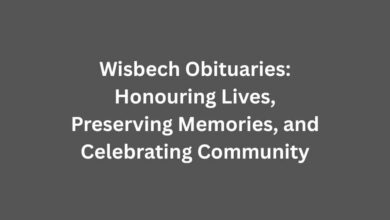Andrew Deakin: A Leading Barrister in Human Rights and Public Law

Among the highly respected figures in the British legal system, Andrew Deakin stands out as an exceptional barrister who has made a name for himself in the intricate areas of public law, civil liberties, and human rights. His commitment to fairness, precision, and justice reflects the finest traditions of the Bar in England and Wales. Based at the distinguished 39 Essex Chambers in London, Deakin is widely recognised for his depth of legal understanding and his exceptional ability to handle sensitive national-security cases.
Early Career and Education
Andrew Deakin’s early academic and professional journey reflects the rigour expected of someone practising at the top of British law. After completing his legal studies, he was called to the Bar at Lincoln’s Inn, one of the four Inns of Court that train and support barristers in England and Wales. His early practice focused on public-law cases, where he quickly built a reputation for precise legal drafting, intellectual clarity, and a calm but persuasive style of advocacy.
His initial work involved representing individuals and government bodies in cases that touched upon administrative decisions, immigration issues, and the protection of civil liberties. Through this period, Deakin demonstrated a particular ability to interpret and apply complex statutory frameworks — an ability that would later become one of his professional hallmarks. His combination of academic rigour and practical insight helped him gain recognition within the legal community early in his career.
Establishing a Reputation in Human Rights Law
Human rights law requires not only technical knowledge but also a deep appreciation of ethics, fairness, and proportionality. Andrew Deakin is among those rare barristers who combine these qualities effortlessly. His cases often involve sensitive questions relating to the rights of individuals versus the powers of the state — a constant theme in modern British constitutional and public law.
He has acted in judicial-review proceedings, challenges to administrative decisions, and complex litigation concerning the actions of public authorities. Whether it involves issues of detention, citizenship, deportation, or surveillance, Deakin’s advocacy is known for being both principled and meticulous.
Colleagues and judges alike often commend him for his ability to distil highly technical matters into clear, convincing legal arguments. Chambers & Partners, one of the leading directories that assess legal professionals, describes him as “meticulous in his preparation” and “a thoughtful advocate whose drafting is of the highest quality.” Such recognition is not easily earned; it is the product of consistent excellence over many years.
The Attorney General’s A Panel Appointment
One of the highest professional honours for a junior barrister in the United Kingdom is an appointment to the Attorney General’s Panel of Counsel, and Deakin’s place on the A Panel confirms his standing among the best in the country. Members of this elite group are instructed on behalf of the Crown in the most complex and high-profile cases, often involving national security, public inquiries, or constitutional questions.
This role requires not only exceptional legal ability but also absolute discretion and integrity. The government entrusts these barristers with cases that may involve confidential or classified material. Deakin’s inclusion on the A Panel demonstrates the immense trust placed in his judgment and professionalism by the highest levels of the legal establishment.
The appointment also reflects his sustained record of excellence, as barristers are promoted to the A Panel only after serving with distinction on the junior panels. His re-appointment in 2023 further underscores his continuing value to the government and his ongoing contribution to shaping public law at the national level.
Areas of Specialisation
Andrew Deakin’s expertise spans a range of public-law disciplines, each of which demands a sophisticated understanding of how law interacts with public policy and individual rights.
National Security Law
Deakin has frequently advised government departments on matters involving national security — an area that requires a careful balance between protecting the public and safeguarding civil liberties. These cases often arise in the context of citizenship deprivation, counter-terrorism measures, and information-control issues. His ability to navigate the legal and ethical complexities of such cases makes him a vital contributor to the UK’s legal infrastructure.
Immigration and Asylum
Another cornerstone of his practice is immigration and asylum law. Deakin regularly appears in cases that examine the fairness and lawfulness of government decisions regarding deportation, detention, and naturalisation. He has represented both individuals seeking redress and government departments defending their actions, which gives him a rare perspective on both sides of the legal equation.
Civil Liberties and Human Rights
In this field, Deakin tackles some of the most important questions about state power and individual freedom. His work includes cases challenging government decisions under the Human Rights Act 1998 and the European Convention on Human Rights. Whether representing the Crown or an individual, he consistently focuses on ensuring that the principles of fairness and due process remain at the heart of the proceedings.
Public and Regulatory Law
Deakin’s practice also extends into the fields of public inquiries, inquests, and regulatory law. He has appeared in matters concerning government accountability, data protection, and the Freedom of Information Act. His nuanced understanding of administrative decision-making allows him to advise both regulators and regulated entities with equal authority.
Notable Cases
Over his career, Andrew Deakin has been involved in several important cases that illustrate both his range and his impact on the development of public law.
R (D4) v Secretary of State for the Home Department [2022] EWCA Civ 33: This case involved a challenge to the British Nationality (General) Regulations 2003 concerning the deprivation of citizenship. Deakin’s arguments helped clarify the interpretation of key procedural provisions in citizenship law.
Johnson v Secretary of State for the Home Department: A damages claim involving allegations of unlawful detention and mistreatment during a deportation attempt. The case raised complex questions about the limits of state immunity and the doctrine of Acts of State.
C3, C4, C7 v Secretary of State for the Home Department (SIAC SC/167/2020): Here, Deakin acted for the government in national-security litigation concerning deprivation of citizenship.
KT v Secretary of State for Work and Pensions [2020] UKUT 252 (AAC): A significant case interpreting how the concept of “safely” should be applied in the context of disability benefits.
Findlay and Da Silva v Department for Business, Energy and Industrial Strategy [2018] EWHC 1591 (QB): Deakin represented the government in claims of misfeasance in public office and malicious prosecution.
Each of these cases illustrates his versatility and his command of the law in both principle and practice. They also highlight his influence on evolving legal standards in the United Kingdom.
Professional Qualities and Recognition
In a profession that values both intellect and integrity, Andrew Deakin has distinguished himself on both fronts. Legal directories such as Chambers & Partners and The Legal 500 consistently rank him as a leading junior in the field of Civil Liberties and Human Rights. Clients describe him as “calm under pressure,” “precise in his reasoning,” and “a barrister who can be trusted with the most complex of briefs.”
Colleagues also remark on his ability to work collaboratively, a quality essential in multi-party litigation and large public-law teams. Despite the often adversarial nature of legal practice, Deakin’s measured and professional approach has earned him respect from both sides of the courtroom.
39 Essex Chambers and Its Environment
Being part of 39 Essex Chambers places Deakin among a cohort of exceptional barristers specialising in public, commercial, and international law. The chambers is known for its intellectual culture, high-profile clientele, and contributions to major legal reforms. Working in such an environment provides access to interdisciplinary collaboration and exposure to cases that shape British jurisprudence.
At 39 Essex Chambers, Deakin contributes to a legacy of excellence that includes some of the country’s most respected judges and advocates. The chambers’ ethos of integrity, scholarship, and public service aligns closely with Deakin’s own professional principles.
Impact and Influence
The influence of Andrew Deakin extends beyond his own cases. Through his work, he contributes to the ongoing dialogue between individual rights and government authority — a central theme in any democratic society. By handling cases that often define the boundaries of executive power, Deakin helps maintain the delicate balance that underpins British constitutional law.
His drafting skills have influenced how public-law pleadings and government submissions are prepared. Many junior barristers and government lawyers study his written arguments as models of clarity and precision. This quiet but significant impact shows his importance not only as an advocate but also as a teacher and example within the legal community.
Personal Ethos and Professional Standards
Though much of his work is confidential, Deakin’s professional ethos is clear from his public record. He approaches each case with humility and a sense of duty, reflecting the core values of the Bar — independence, objectivity, and respect for the rule of law. His ability to balance analytical rigour with empathy makes him an advocate who inspires confidence among clients and colleagues alike.
He is known for preparing meticulously, reading every line of evidence, and anticipating the arguments of the opposing side. This disciplined approach not only strengthens his advocacy but also reinforces the fairness of the proceedings in which he participates.
The Future of His Legal Career
As Britain continues to navigate issues surrounding immigration, security, and human rights, barristers like Andrew Deakin will remain central to interpreting and upholding the law. His position on the Attorney General’s A Panel ensures that he will continue to shape key government cases, and his growing experience suggests the potential for future judicial or leadership roles within the legal profession.
Given his steady rise and the respect he commands, it is likely that Deakin’s influence will only deepen over the coming decade. He embodies the qualities that define a modern barrister — intellectual excellence, ethical integrity, and unwavering dedication to justice.
Conclusion
In an era when the relationship between government authority and individual liberty is under constant scrutiny, Andrew Deakin represents the very best of the British legal tradition. His work in human rights, public law, and national security demonstrates that careful reasoning and fairness can coexist even in the most difficult circumstances.
From his beginnings at Lincoln’s Inn to his current standing at 39 Essex Chambers and the Attorney General’s A Panel, Deakin’s journey reflects both talent and integrity. His continued contributions to public law ensure that the principles of justice remain at the heart of government decision-making.



